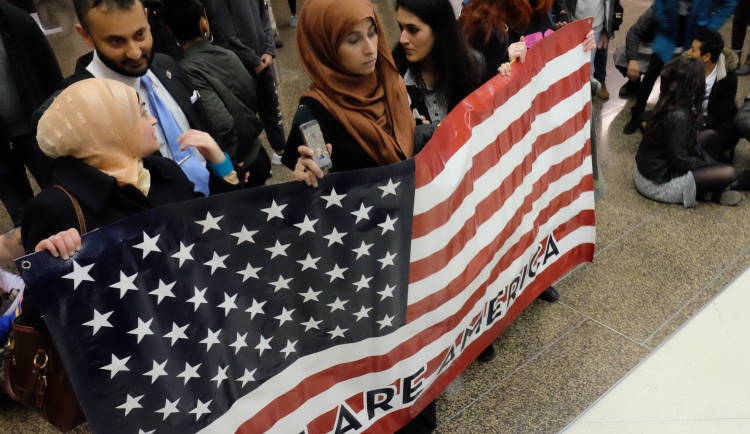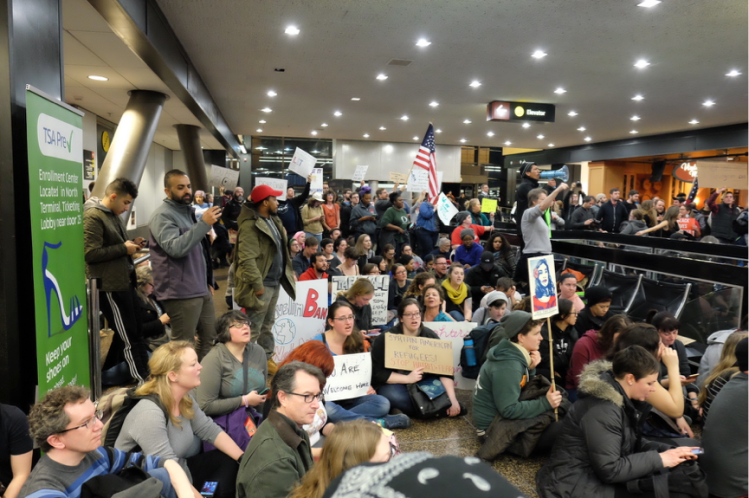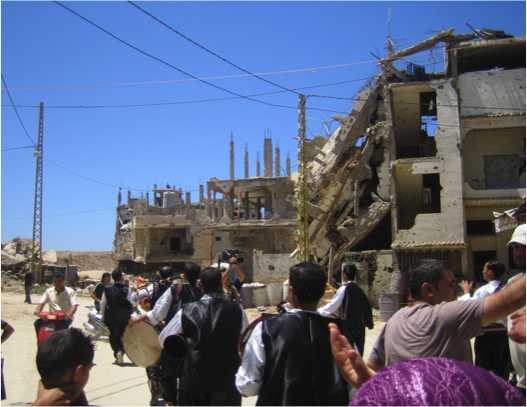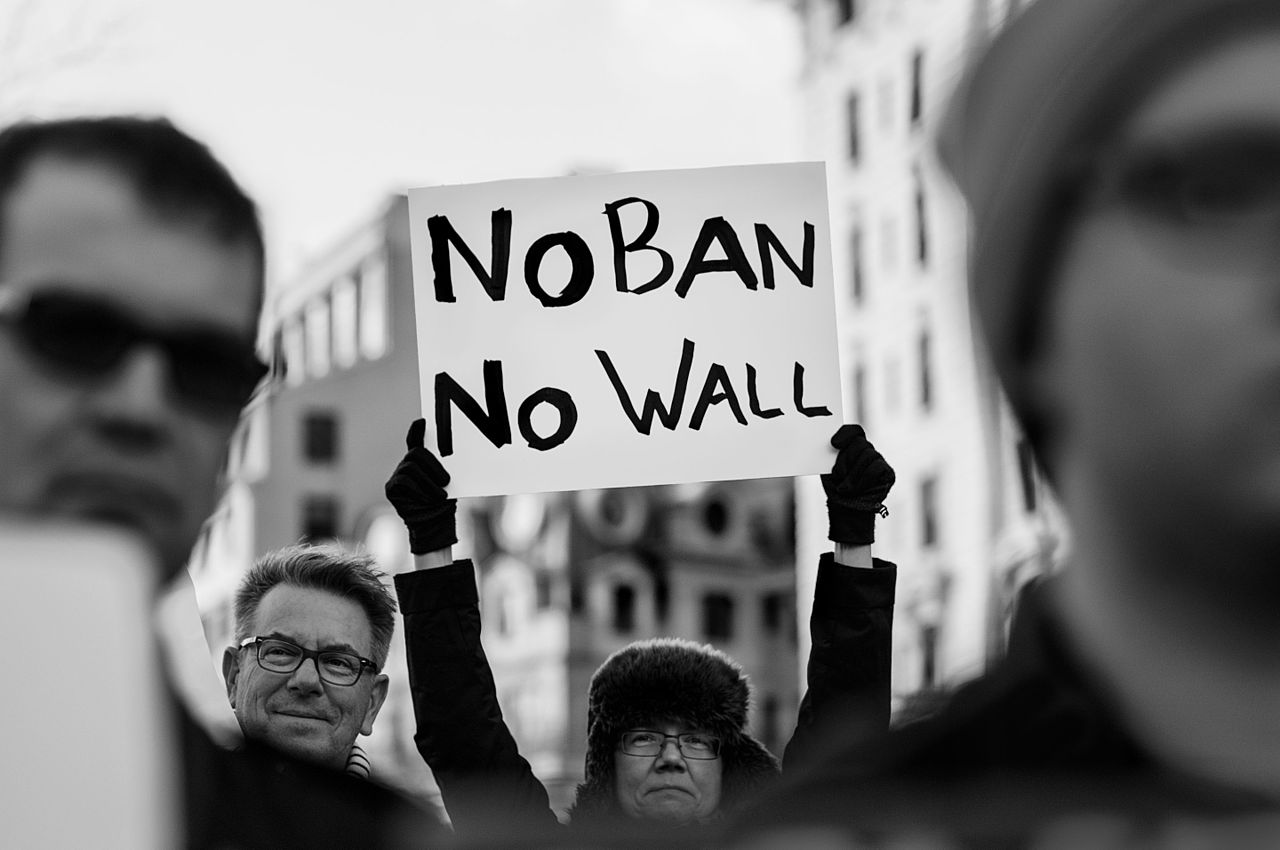By Aydan Greatrick and Elena Fiddian-Qasmiyeh, University College London
This piece puts Trump’s recent “Muslim Ban” (and the exceptional responses to it) in context by focusing on the everyday dynamics of in/security and im/mobility that have long framed the lives of refugees, asylum seekers and immigrants from the Middle East and North Africa, including refugees from Syria. It draws in particular on the approaches taken by the Refugee Hosts project, which aims to explore the viability of developing sustainable communities of welcome – specifically local communities – whose members offer support and solidarity to refugees and asylum seekers at the non-state level. By centralising refugees’ lived experiences of different forms of displacement and immobility within and from the Middle East, and by recognising the extent to which fears of exclusion and expulsion may travel with refugees across time and space – even after they have become European or American citizens – the particular urgency of developing these communities of welcome becomes evident. We argue that it is in this way that we can seek to expand opportunities for solidarity with and protection for refugees not just in response to state-level xenophobia, but also to the realities of local-level hostility and hospitality alike.
Global In/Security and Im/Mobility in Context
The shock that greeted President Trump’s travel ban ruling was seismic, inspiring massive demonstrations in opposition to the Executive Order barring individuals from seven Muslim-majority countries from entering the USA. Observers repeatedly asked: How could a President block Muslim refugees, asylum seekers, immigrants – and even US green card holders – from entering the United States? While Judges found the original ban to be unconstitutional, Trump’s administration has vocally asserted that alternative policies to block the entry of refugees and migrants from these countries will soon be implemented as a priority. This highlights the precarity and insecurity that individuals, families and entire communities will continue to face throughout the foreseeable future.
As is the case within the ever-expanding public and academic critiques of the ‘Muslim ban’, within the context of the Refugee Hosts project we also believe it is important to reflect carefully on these recent, and ongoing, events. From the perspective of our project, of course, this is a pivotal issue for many members of the refugee and host communities we are working with in Lebanon, Jordan and Turkey. Many of our current and future interlocutors and research participants have been directly and indirectly affected by the ban and related policies: long-awaited resettlement plans (necessary for refugees’ protection) have been put on hold; student and business visas have been cancelled; relatives visiting from the US have been left ‘stuck’ in the region’s camps and cities unable to return ‘home’.
In addition to these impacts on refugees’ and hosts’ lives, we also find it important to consider what can be gleaned from developing a more grounded analysis of ‘the ban’ that centralises refugees’ lived experiences of different forms of displacement and immobility – past, on-going, overlapping – within and from the Middle East.

Indeed, a largely implicit element of the collective shock towards the ban has been the recognition that the policy has not only prevented refugees’, migrants’ and citizens’ arrival in the US, but also blocked people from leaving different spaces: their place of first asylum in the Middle East and Africa, and their diverse places of residence, vacation, settlement and/or transit, even when they held valid visas, residence permits and even US passports. While international forced migration has long been hypervisible in media and political rhetoric, the ban also forces us to meaningfully acknowledge “the realities of involuntary immobility – people who are “internally stuck” – and those who are physically prevented from crossing… borders” both to seek protection as refugees or to live ‘normal’ lives as citizens. It is thus essential to identify the travel ban as one of many processes that restrict both the entry and exit of people, as simultaneously preventing movement and enforcing immobility.
Putting Exclusion and Im/Mobility in Context
Such processes have a long history, and, as has now been widely acknowledged, it is evident that Trump’s actions are neither new nor exceptional: in effect, the travel ban has many commonalities with other exclusionary policies, such as the recent decision by the UK government to cease its obligations to child refugees under the ‘Dubs’ agreement, thereby leaving them stranded in precarious camps in France, or the infamous EU-Turkey deal which has seen Syrian refugees pushed back to Turkey from Greece, breaching long-standing norms of non-refoulement.
All of these policies have been framed by a politics of exclusion and immobility. They share in and contribute to a climate of Islamophobia and xenophobia that have for decades shaped the experiences of refugees and asylum-seekers living in Europe and North America. For instance, research conducted over the past decade has evidenced the unequal impacts that British anti-terrorism measures (and the related global in/security context) have had on Muslim Middle Eastern asylum-seekers and refugees in that country:
“Muslim asylum-seekers’ and refugees’ identities have been transformed in/by the public imagination, moving from an emphasis on their ‘refugee-ness’ and categorization as either ‘bogus’ or ‘genuine’ asylum-seekers, to a primal concern with their Muslim identity, which is equated with a threatening identity.”
This assessment, written by Fiddian-Qasmiyeh and Qasmiyeh in 2010, corroborates the rhetoric surrounding Trump’s travel ban: meeting the protection needs of refugees is overruled by ‘national security’ concerns, and the need for ‘extreme vetting’ which – in this instance – calls for heightened scrutiny not of the validity of a refugee’s claim to asylum, but of the extent to which their ‘Muslim-ness’ (real and imagined) makes them a security risk.

Spaces of Everyday In/Security
The forcible unveiling and inscription of identity markers – ‘as’ a ‘Muslim’, a ‘Middle Easterner’, a ‘refugee’, an ‘Other’ – that have played out in the queues for passport control both at Arrivals in US airports and in Departures (and runways) across the Middle East and Europe – are reminiscent of the processes long-experienced by refugees and asylum-seekers in airports and immigration reporting centres, but also in seemingly innocuous spaces such as post-offices across the UK.
Whether arriving, departing or just trying to remain in place, such spaces have long been part of the everyday landscapes in which ‘Muslim-ness’, ‘Refugee-ness’, and ‘Other-ness’ have regularly been unveiled in front of different officials and ‘normal’ citizens in diverse queues. Indeed, as Qasmiyeh has noted with regards to the otherwise seemingly neutral space of the post-office, where asylum seekers in the UK used to cash their living allowances,
“Subtly withdrawing their [identification document] from a pocket or wallet, attempting to minimize disclosure, the [refugee] feels that this space/place becomes a stage where all lights are on him/her.”
As such, global trends in terrorism-related in/security policies have encouraged a combination of regional and religious identity markers – regardless of whether they are real or imagined – to define officials’ and many citizens’ perceptions of Muslim refugees on the one hand, and the ways in which these asylum seekers and refugees themselves experience, resist, negotiate and respond to this everyday scrutiny on the other. As succinctly noted by Um Omar, who was born in a Palestinian refugee camp in Syria and was interviewed in the UK by Fiddian-Qasmiyeh and Qasmiyeh in 2010,
“Things are hard. There is racism and I am very concerned about my children. They are attacked and insulted, both at school and on the street.”
Following Trump’s travel ban, this everyday in/security came to a head for US Green Card holders, including those self-identifying as, and/or inscribed as, Muslim or Middle Eastern. Many are now afraid to leave the country for fear that they will be barred from re-entering the US, demonstrating how – even with the granting of permanent residence – insecurity can continue to define refugees’ and immigrants’ experiences in their new host countries.
Travelling Fear and Hostipitality
Importantly, this insecurity characterises life across a range of geographies and temporalities. For example, within the Middle East, Palestinian refugees who hold Jordanian citizenship have repeatedly been stripped of their nationality and rendered stateless once again. Indeed, as Elena has argued in ‘On the Threshold of Statelessness,’ we might think of this in relation to what she refers to as the concept of ‘travelling fear’ (drawing on Said’s ‘travelling theory’). In this context, this can be understood as relating to the fear that a refugee may have of being stripped of their seemingly ‘stable’ legal status, and of their rights.
In effect, this fear can travel with a refugee throughout their lives, accompanying them on their journeys from the Middle East to the global North. For instance, Marwa, a 30-year-old born in a refugee camp in Syria and interviewed in Sweden in 2014, argued that:
“The fear becomes part of your identity because wherever you go, you are not fully accepted. Sweden can today be the perfect partner but still there is a fear that this relationship can change and end.”
Cited in Fiddian-Qasmiyeh, 2016
Importantly, well before the ‘Muslim Ban’, refugees and ‘former’ refugees have framed this fear in relation to the ambiguities of democratic politics, which in theory allows a newly elected president to call for the deportation of a certain group of refugees and asylum seekers, even after they have ostensibly ‘become’ new citizens of the state.
While this scenario has not materialised in Sweden, in a particularly prescient statement, 33-year-old Faisal, who was born in a refugee camp in Lebanon and was also interviewed in Sweden in 2014, expressed his concern that there was no
“guarantee that the next president or government will not do the same thing as previous governments… Palestinians probably think that Sweden can one day have a racist government and can deport them.”
Cited in Fiddian-Qasmiyeh, 2016
As Elena has argued (here), this resonates clearly with the concept hostipitality astutely theorised by Derrida (2000), highlighting that “hospitality” is always “parasitized by its opposite, ‘hostility’, the undesirable guest which it harbours as the self-contradiction within its own body” (ibid: 3). As such, hospitality itself inherently bears “its opposite” but also its own opposition, the ever-present possibility of hostility towards the Other who has, at one time, been welcomed at the threshold, and yet, “Perhaps no one welcomed is ever completely welcome” (ibid: 6; also see Fiddian-Qasmiyeh and Qasmiyeh, 2016).
As such, Trump’s travel ban, and the insecurity that it has brought to thousands of Muslim refugees, asylum seekers, immigrants and citizens, is far from unique. It may be particularly conspicuous both in its declarative nature and in the massive mobilisation of resistance and solidarity it has prompted, but its implications will be familiar to many (currently and formerly) displaced people, and to many Muslims (and many people perceived to be Muslims) whose daily lives are characterized by exclusion and/or insecurity around the world.
Geographies of Im/Mobility
Importantly, this is of course also true for refugees and asylum seekers in Lebanon, Jordan and Turkey (our Refugee Host project’s key ‘research sites’). Confronted by the EU’s ‘pathology’ of historical denial and increasingly securitised borders, refugees in the Middle East are also “internally stuck”, forced into a situation of intense uncertainty. Indeed, while often justified through other discourses and politicised rhetoric than those presented by Trump, nationality-based restrictions of movement are widespread around the world, including in the Middle East.
For instance,¹ in spite of the widespread conflict in Syria at that time, Jordan barred the entry of all Palestinian refugees who had been living in Syria as early as 2012, and effectively closed its borders to all refugees from Syria in June 2016. This has left over 75,000 people stranded in border camps along the Jordanian-Syrian border. In turn, by January 2017, Turkey had closed 17 of its 19 border crossings with Syria, and has for years regularly prevented Syrian refugees from entering its territory, including by using physical force. These people’s inability to cross international borders, and the ongoing precarity refugees face both within Syria and in neighbouring countries, often remains invisible to the international community, including to the crowds that are so vocally protesting the US travel ban.

Conclusion
It is important to recognise that in/securities and exclusions have played out – and continue to play out – across different contexts: far from starting with Trump or in the US, these processes find their roots in deep-seated inequalities that have for decades characterised both experiences of and responses to displacement.
In light of this, it seems imperative that we develop a more nuanced understanding of the local encounters that frame the everyday experiences of refugees and migrants, whether in the Middle East or internationally. Some of these discussions are already underway through the Refugee Hosts blog, and will continue to develop throughout (and beyond) the life of this project. Indeed, a key aim of our research is to explore the viability of developing sustainable communities of welcome – specifically local communities – whose members often engage in everyday dynamics of hosting refugees at the non-state level, offering an antidote to the international policies of exclusion that continue to frame state-level responses to displacement. This is vital if we are to ensure that solidarity and protection can be expanded for – rather than withdrawn from – those fleeing from conflict and widespread violations of human rights and dignity around the world.
Notes
1 This paragraph draws on Fiddian-Qasmiyeh’s article in The Conversation, ‘Syrian refugees in Turkey, Jordan and Lebanon face an uncertain 2017‘.
Bibliography
Derrida, J. (2000) ‘Hostipitality,’ Angelaki: Journal of the Theoretical Humanities, 5(3): 3-8.
Fiddian-Qasmiyeh, E. (2017) ‘Syrian refugees in Turkey, Jordan and Lebanon face an uncertain 2017‘, The Conversation, 3 January 2017.
Fiddian-Qasmiyeh, E. (2016) ‘On the Threshold of Statelessness: Palestinian narratives of loss and erasure,’ Journal of Ethnic and Racial Studies, 39(2): 301-321.
Fiddian-Qasmiyeh, E. (2016) ‘Refugees Hosting Refugees,’ Forced Migration Review, September 2016.
Fiddian-Qasmiyeh, E. and Qasmiyeh, Y. M. (2016) ‘Refugee Neighbours and Hostipitality: Exploring the complexities of refugee-refugee humanitarianism,’ The Critique, 5 January 2016.
Fiddian-Qasmiyeh, E. and Qasmiyeh, Y.M. (2010) ‘Muslim Asylum-Seekers and Refugees from the Middle East and North Africa: Negotiating politics, religion and identity in the UK,’ Journal of Refugee Studies, 23(3): 294-314.
Fröhlich, C. (2016) ‘The European Response to the Syrian Crisis: Pathologies Uncovered,’ E-International Relations 8 July 2016.
Greatrick, A. (2016) ‘Externalising the ‘Refugee Crisis’: A Consequence of Historical Denial?‘, Refugee Hosts, 27 November 2016.
Loris-Rodionoff, C. (2017) ‘Loss and Everyday Life on the Syrian-Turkish Border‘, Refugee Hosts, 30 January 2017.
Featured Image: Protesting Trump (Wiki Commons)

9 comments